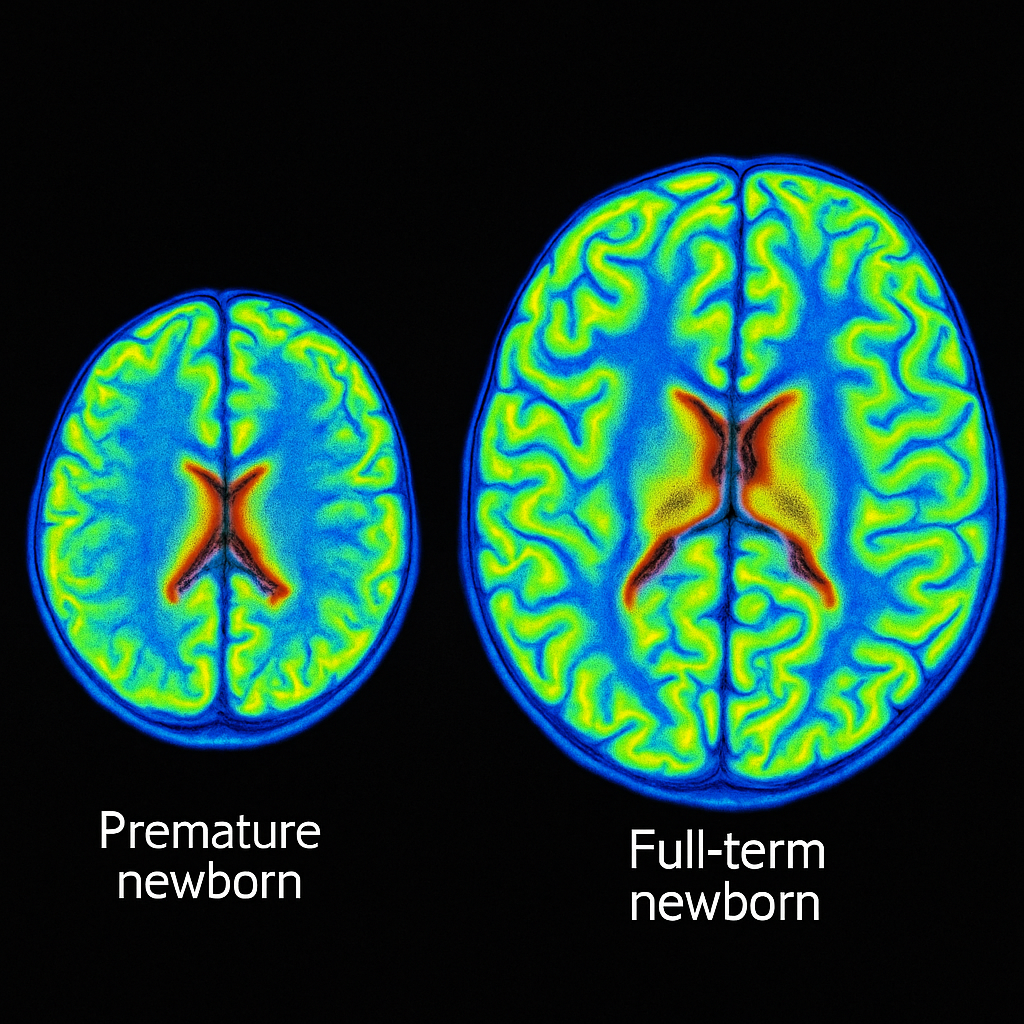When a baby is born prematurely—before 37 weeks of gestation—their brain misses out on critical growth that typically occurs in the womb during the third trimester. Research shows the brain should grow by about 140% during this period, forming roughly two million neural connections per second. See Brain Growth in Preterm Infants. Outside the womb, this rapid development must continue without the protective uterine environment, posing unique challenges. The good news? Loving, science-backed actions from parents and caregivers can significantly bridge this gap, fostering lifelong learning, movement, and emotional health.
- What happens to the brain when a baby is born early?
- How can NICU routines safeguard and grow a premature brain?
- What daily activities at home spark neural connections the fastest?
- Which nutrients and feeding strategies fuel preemie brain growth best?
- How do sleep, sensory environment, and stress management shape neural wiring?
- When should parents seek professional help or early intervention?
- What long-term outcomes can you expect—and how can you stack the odds?
- How can parents protect their own mental health and harness digital supports?
- Your Top Questions, Answered
- Final Thoughts
What happens to the brain when a baby is born early?
Premature birth disrupts several critical brain development processes, particularly in the third trimester, when rapid growth and neural wiring occur.
Here’s what happens when a baby is born early:
- Cortical Volume Reduction: The cortex, responsible for functions like thinking, memory, and sensory processing, can be up to 20% smaller in preterm infants at term-equivalent age (the age they would have reached if born at 40 weeks) compared to full-term peers. Children born very preterm experience altered cortical expansion over the first decade of life. This reduction can impact cognitive and sensory development, but enriched care can promote catch-up growth.
- White-Matter Delays: White-matter tracts, which act as communication “highways” between brain regions, often develop more slowly in preterm infants. Delayed myelination (the formation of a protective sheath around these tracts) can lead to challenges with attention, coordination, or motor skills later in childhood. Male preemies face a 30% higher risk of white-matter injury, making early screening critical as per White Matter Injury in the Preterm Infant.
- Sensory System Challenges: In the womb, sensory systems like hearing, vision, and touch are fine-tuned through natural stimuli. Premature birth disrupts this calibration, potentially leading to sensory processing difficulties. Targeted stimulation after birth, such as visual tracking games or gentle touch, can help recalibrate these systems.
- Neuroplasticity and Resilience: Despite these challenges, the preterm brain is highly plastic, meaning it can adapt and form new connections with the right support. Early interventions are key to leveraging this plasticity, particularly in the first two years of life.
Curious how movement helps repair these connections? Visit How Physical Activity Boosts Your Baby’s Brain.

How can NICU routines safeguard and grow a premature brain?
The neonatal intensive care unit (NICU) provides a controlled environment where evidence-based practices can mimic the womb and promote healthy brain development.
Here are key interventions to advocate for:
- Kangaroo Care: Skin-to-skin contact, known as kangaroo care, involves holding your baby against your bare chest for at least one hour daily. This practice stabilizes heart rate, improves oxygenation, and boosts synapse formation, which is critical for neural connectivity.
- Controlled Sensory Environment: NICUs that use dim lighting (≤50 lux) and soft sound protocols (≤45 dB, can reduce infant stress hormones by up to 40%, supporting neurological health. Excessive noise, often ranging from 70 to 120 dB in busy NICUs, can increase stress and divert energy from brain growth.
- Voice Therapy: Reading or singing to your baby for 15 minutes daily may reduce apnea events (pauses in breathing) and stimulate early language networks. If you can’t be present, consider recording a bedtime story for consistent exposure.
- Supportive Positioning and Gentle Handling: Positioning your baby in a flexed “nest” with arms and legs tucked reduces the risk of intraventricular hemorrhage and promotes calmer sleep. Limiting clustered medical procedures and ensuring long, uninterrupted sleep cycles further support neural development.
For sensory-system tips, see Hearing and Vision: Why They’re Key for Baby’s Learning.
What daily activities at home spark neural connections the fastest?
Once your preemie is home, simple daily activities can spark neural growth and strengthen developmental pathways.
Here are evidence-based strategies:
- Language Exposure: Talking, reading, and singing to your baby, aiming for 30,000 words per week, is linked to an eight-point IQ increase by age 3. Check Language Exposure and IQ. Use simple, face-to-face interactions to stimulate language networks.
- Tummy Time: Three 5-minute tummy-time sessions daily strengthen the vestibular system, preparing your baby for crawling and other motor milestones. Place a rolled towel under their chest for support if needed.
- Visual Stimulation: Use mirror games or high-contrast black-and-white cards to enhance visual tracking. Discontinue these once your baby can follow objects smoothly across the midline, typically by 4–6 months corrected age.
- Moderate-Pressure Massage: Gentle strokes from shoulders to feet increase insulin-like growth factor 1 (IGF-1), a hormone linked to dendrite growth.
- Gentle Floor Exercises: Try bicycle-leg movements or toe-touch exercises to promote motor development and neural connectivity. Supervise all activities to ensure safety. Try the bicycle-leg and toe-touch moves in 5 Baby Exercises to Boost Brain Development.

Which nutrients and feeding strategies fuel preemie brain growth best?
Nutrition is a cornerstone of preterm brain development. Breast milk is the gold standard, with studies showing that when it constitutes at least 50% of a preemie’s diet, cortical tissue grows by an additional 5 cm³ by the due date. See Breast Milk and Cortical Maturation. If maternal breast milk is unavailable, donor milk or fortified preemie formulas are effective alternatives. Key nutrients include:
| Nutrient | Why It Matters | Typical Target |
|---|---|---|
| Calories | Fuels rapid brain growth | 110–130 kcal/kg/day |
| Protein | Builds myelin and neurotransmitters | 3.5–4 g/kg/day enteral |
| DHA:AA | Supports vision and cognition | 2:1 ratio in fortifier |
| Iron | Prevents anemia, aids myelination | 2 mg/kg/day until 12 months |
| Choline | Supports cell membranes and memory | 50 mg/kg/day |
Work with your neonatologist to balance these nutrients, as excessive early parenteral protein (>3 g/kg/day) may be linked to smaller head circumference. Probiotics may also support the gut–brain axis, potentially reducing necrotizing enterocolitis (NEC) risk and enhancing cognition.
Learn more in Baby Gut Health: How It Supports Brain Development.
How do sleep, sensory environment, and stress management shape neural wiring?
Quality sleep and a supportive sensory environment are neuroprotective for preterm infants. Follow these tips:
- Safe Sleep Practices: Place your preemie on their back on a firm surface in a room kept at 68–72°F (20–22°C). Preemies face a 2–3 times higher risk of sudden infant death syndrome (SIDS), so adhere to the ABCs: Alone, on their Back, in a Crib.
- Light–Dark Cycles: Establish 12-hour light–dark cycles to set melatonin rhythms, which can mature four weeks earlier with consistent cues.
- White Noise: Use steady white noise at ≤50 dB to mimic womb sounds, as louder levels may delay auditory pathway development.
- Parental Stress Management: Elevated caregiver stress can increase infant stress markers. Schedule short self-care breaks or try deep-breathing exercises to manage your own cortisol levels.
When should parents seek professional help or early intervention?
The first two years of life are a critical window for brain plasticity, making early intervention essential. Monitor for these developmental red flags (using corrected age, which adjusts for prematurity):
- No social smile by 3 months
- Poor head control by 4 months
- Limited babbling by 6 months
- Not sitting with support by 7 months
- Persistent hand fisting after 4 months
Schedule developmental screenings at 2, 4, 6, 9, 12, 18, and 24 months. Early intervention programs, such as physical or occupational therapy, can address delays effectively, with tele-therapy options achieving 90% family engagement. See Early Intervention Efficacy.
If chronic ear infections crop up, see Ear Infections: How They Affect Your Baby’s Brain.
What long-term outcomes can you expect—and how can you stack the odds?
With early support, about 70% of late-preterm infants (34–36 weeks) reach age-level skills by 24 months as per Preemie School Performance. Even infants born as early as 23–24 weeks can achieve kindergarten readiness with appropriate interventions. Adolescents born preterm often excel in empathy and perspective-taking, skills valuable in collaborative careers.
To stack the odds in your child’s favor:
- Advocate for school supports like Individualized Education Plans (IEPs) or 504 Plans.
- Encourage gross and fine motor play to strengthen neural pathways—ideas in Fine Motor Skills: Boosting Your Baby’s Brain Power.
- Foster resilience through consistent routines and warm parent–child attachment.
How can parents protect their own mental health and harness digital supports?
The NICU experience can be emotionally taxing, with up to 70% of parents screening positive for postpartum depression or PTSD as in NICU Parental Mental Health. Request screenings like the Edinburgh Postnatal Depression Scale (EPDS) at two weeks and three months post-discharge. Helpful tools include:
- MyPreemie App: Tracks corrected-age milestones and syncs with electronic health records.
- Tele-Counseling and Peer Groups: Reduce anxiety by 35% through virtual support.
- Home-Visiting Programs: May improve developmental scores by 15%, per pilot data.
If English isn’t your first language, request interpreter services to improve therapy adherence by 30%.
Your Top Questions, Answered
-
Does every preemie have brain damage?
No. The risk rises with gestational ages below 32 weeks, but many preemies avoid injury altogether, and early, enriched care can lessen long-term effects. -
When will my preemie sleep through the night?
Most preemies manage six-hour stretches by 6–8 months corrected age. Keep bedtime consistent and limit daytime noise to help circadian rhythms mature. -
Is physical activity safe for a tiny baby?
Yes—gentle, supervised floor play is both safe and beneficial. See milestone-specific moves in Gross Motor Milestones: Supporting Your Baby’s Brain. -
Can my baby catch up intellectually?
Often, yes. With early intervention, 80 % of preemies test within the average IQ range by kindergarten. -
What if we can’t provide breast milk?
Donor milk or preemie-specific formula still supports brain growth. Ask about fortifiers to match the nutrient density of maternal milk.
Final Thoughts
Your preemie’s brain is fragile yet remarkably resilient. By combining NICU interventions like kangaroo care, home activities like tummy time and massage, nutrient-rich feeding, and early intervention, you can transform everyday moments into opportunities for neural growth. Celebrate each milestone, from a first smile to a first step, knowing you’re helping your tiny fighter not just survive, but thrive.
Explore more brain-boosting moves in 5 Baby Exercises to Boost Brain Development, and keep celebrating each hard-won milestone—you’re helping your tiny fighter not just survive, but truly thrive.